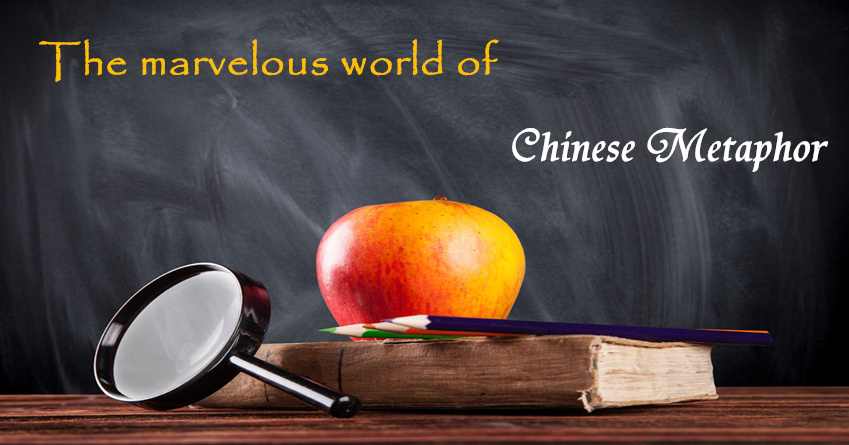The Marvelous World of Chinese Metaphor — When you can’t see the point, and all compasses point north

In my posts, I’ve touched before on how important it is to approach language as a structure, not as a laundry list. When you learn phrases and sentences, rather than piecemeal words, you learn faster, and better. The analogy I like best is a room full of marbles. It will take a while to pick them up one by one, but much less time if you scoop them up in bags. (Leaving open, of course, the question of why you’re trying to clean up a room full of marbles. Wild night?)
But below the level of grammar, there’s something deeper at work. This deeper level is the underlying metaphors of the language you’re approaching—the ideas and concepts that anchor its vocabulary. Native speakers take these for granted. Second-language learners don’t always have that luxury.
For example, most languages tend to associate warmth with emotion, particularly affection. You can meet with a warm welcome (热烈欢迎 rèliè huānyíng) or a cold reception (冷遇 lěngyù). Indifference is cold, frigid, 冷漠 (lěngmò). When we get angry, we get steamed, hot under the collar (生气 shēngqì).
Looking at the two languages in terms of their shared figurative language makes it much easier to remember grammar and vocabulary. Rather than memorize thousands of individual phrases, you only need to recognize a few dozen underlying patterns. For example:
- We also tend to associate weight with importance. In English we ponder weighty matters, or worry over a grave (see: gravity) situation. So too the Chinese words 重要 (zhòngyào)、重点 (zhòngdiǎn)、重视 (zhòngshì), etc., associate what’s heavy with what deserves attention.
- Both languages tend to see the past as something behind us—it’s 过去的 (guòqu de)—and the future as something ahead of us—前景 (qiánjǐng). Progress, too, steps forward: we 推进 (tuījìn) new initiatives, and 进一步 (jìn yí bù) when we’re making strides.
Noticing these patterns can also help English speakers make sense of directional complements, a notoriously tricky business. As Perry Link notes in his indispensable Anatomy of Chinese, both languages see more as up, less as down. So inflation soars (通货膨胀上去了 tōnghuò péngzhàng shàngqù le) and temperatures rise (温度降了 wēndù jiàng le).
So take heart! At a deep level, English and Chinese are profoundly similar. Of course, there are also significant differences. And when you notice these differences, you can begin to avoid gaffes and errors. To name just a few:
- In English we fall asleep and wake up; in Chinese, we sleep away (睡过去 shuì guòqu) and wake towards (醒过来 xǐng guòlai). So English sees consciousness as vertical, while Chinese sees it as horizontal, a line that we step across.
- Light is associated with knowledge; when we understand, we are enlightened (明白 míngbai) and the situation is made clear (表明 biǎomíng). On the other hand, difficult or abstract things are dark: obscure, 晦涩 (huìsè).But there’s a key difference here. In English, seeing is understanding (I see your point), but not in Chinese: 我看你的意思 (wǒ kàn nǐ de yìsi) is not acceptable.
- As crucial as music may be to English metaphor, its place in Chinese culture is much more deeply rooted. Particularly when it comes to politics. Consider the old idiom 礼乐崩坏 (lǐ yuè bēng huài): literally “rites and music are in ruins,” it refers to a society in disarray. And, of course, a stable society is in harmony (协和 xiéhé).When it comes to political theater, Chinese draws extensively from opera. When a politician begins her career, she gets on stage上台 (shàngtái). If she falls from grace, she gets down from the stage (下台 xiàtái), or even falls off the stage altogether (倒台 dǎotái). When she announces a new policy, she puts it onstage (出台 chūtái). She probably has plenty of behind-the-scenes help (后台 hòutái). If she dissents, she may sing a different tune (唱反调 chàng fǎndiào) or put on a rival show (唱对台戏 chàng duì tái xì).
As you advance as a language learner, you’ll notice more and more of the metaphorical language that draws Chinese together. Try to notice broad patterns. Rejoice in similarities, but also in differences. You’ll start to look at the world with a refreshed, inquisitive eye.





Chinese doesn’t see the past as behind us and the future in front. What about 前天 “the day before yesterday” (literally “front day”) vs. 后天 “the day after tomorrow” (literally “behind day”) and 以前 “before” (“in front of”) vs. 以后 “after” (“behind”)?
当奶奶不快乐了,那她很有可能会把气发在孩子身上。
When grandma is unhappy, nà tā hěn yǒukěnéng huì bǎ qì fā zài háizi shēnshang.
In English, ever since the invention of the steam engine, we have this metaphor of letting of steam, to vent, as if the body is a boiler where emotions build up. I wonder if that is similar in Chinese?